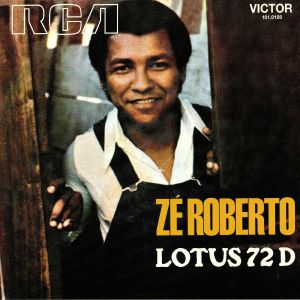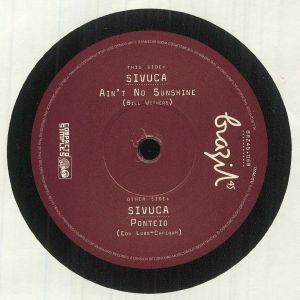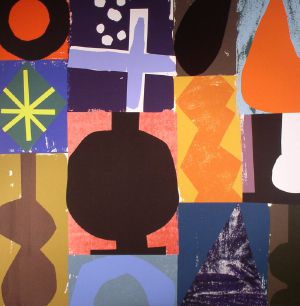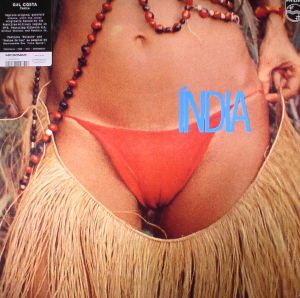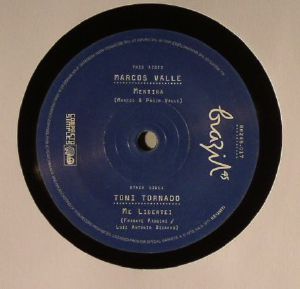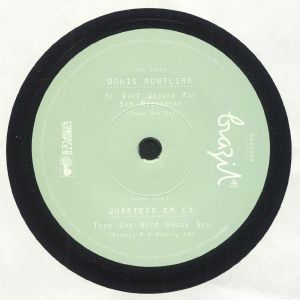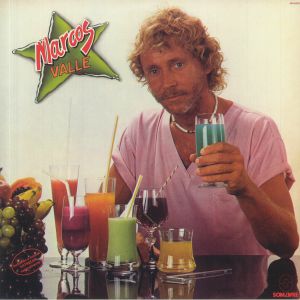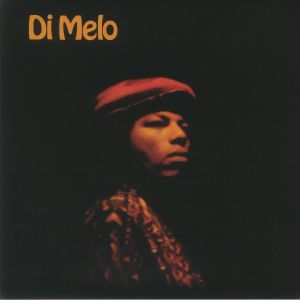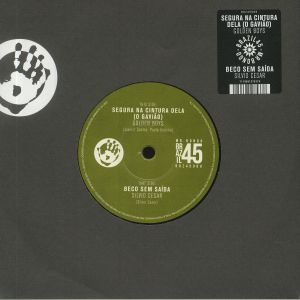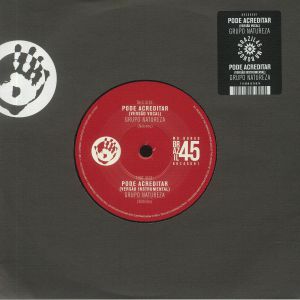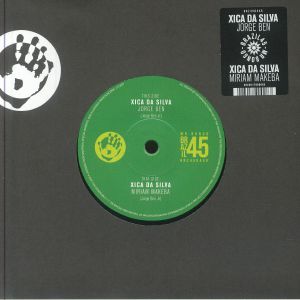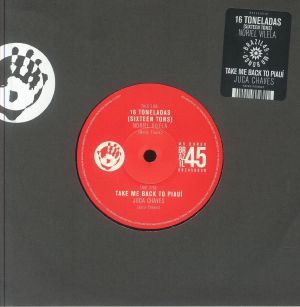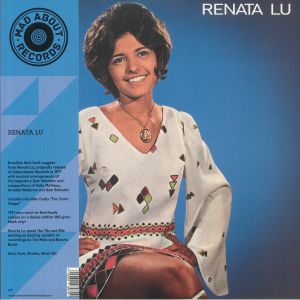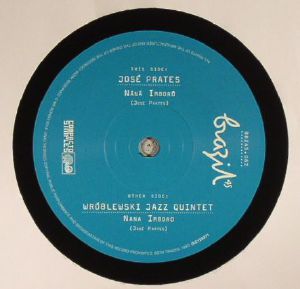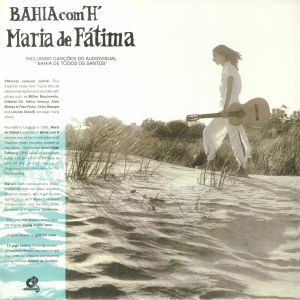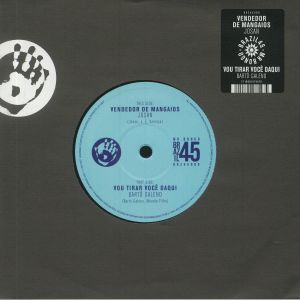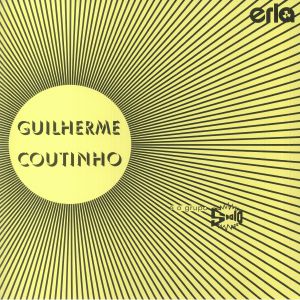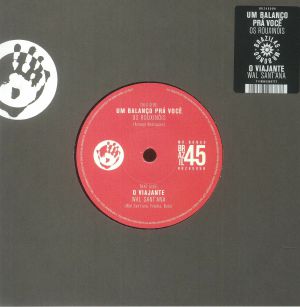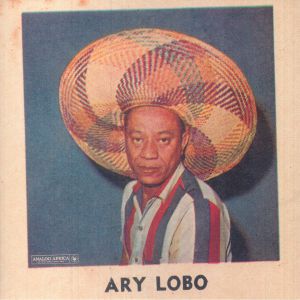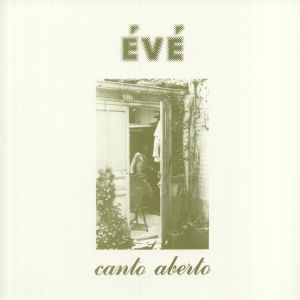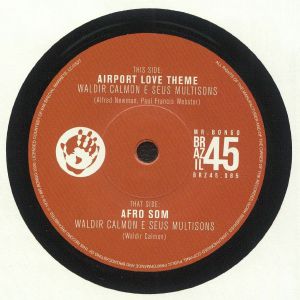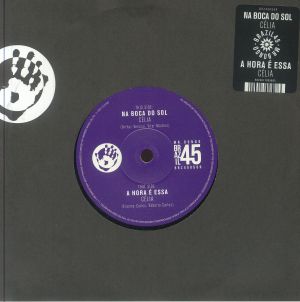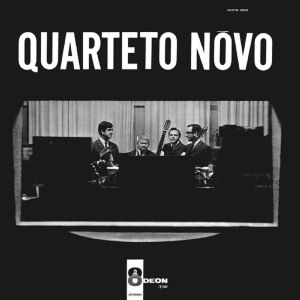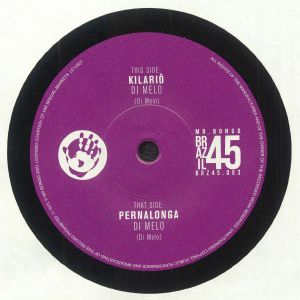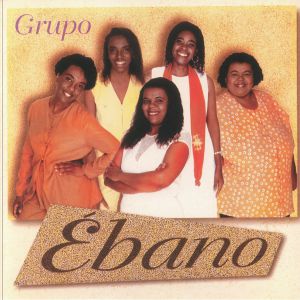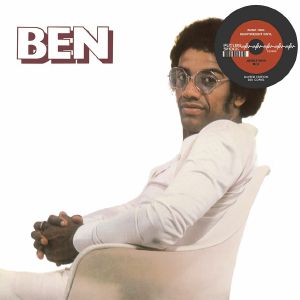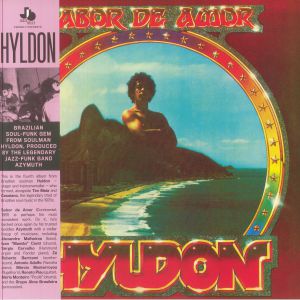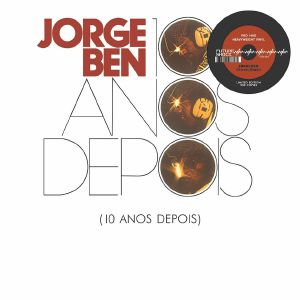Filter
Type
Featured
Release Title
Price
Tags
Tags: MPB
Products tagged as MPB
Artikel 1 bis 33 von 33 auf Seite 1 von 1 anzeigen
Review: Since its release in 1973, Ze Roberto's debut single "Lotus 72 D" has become something of an in-demand item amongst collectors of soul-fired Brazilian "MPB". So much so, in fact, that Mr Bongo has licensed it and served up this 7" reissue. In its original A-side form, the track is a carnival-ready slab of samba-soul brilliance rich in razor-sharp horn blasts, rich bass guitar, punchy hand-percussion and twinkling jazz piano solos. Roberto's confident vocals take centre stage, inviting us towards the dancefloor. Over on the flip you'll find a "Fast Version" of Roberto's tribute to 1972 Formula 1 champ Emerson Fittipaldi. This has a slightly more dancefloor-centric tempo, an effect achieved when it was accidentally pitched up for inclusion on a 2001 compilation.
… Read moreGespielt von: Mukatsuku Records Chart, JimmyTheTwin, Dicky Trisco, Athens of the North (Fryer), Manu Archeo, RUSTAM OSPANOFF., Craig Charles Funk And Soul, Ionik (Traveller Records, KGS), Yoshi Okino (Kyoto Jazz Massive), Flash Atkins, Charlie bucket/ dancing in space, Juno Recommends International, Blair French, Kalita Records, Jake Stellarwell, Dino Soccio
… Read more in stock $15.46
Review: Amongst fans of Brazilian music, Sivuca is arguably best known for his 1973 cover of "Ain't No Sunshine" - later a favourite on the rare groove scene - which re-casts the Bill Withers classic as a sumptuous chunk of shuffling samba sunshine. Here, the track gets reissued as part of Mr Bongo's brilliant Brazil 45s series, alongside his lesser-known - but no less impressive - cover of Edu Lobo's "Ponteio".
… Read more in stock $12.44
MR BONGO / VARIOUS
Mr Bongo Record Club Volume One (reissue) (2xLP + insert)
Cat: MRBLP 141. Rel: 27 Apr 20
International
Review: Brighton based record label, publishers, cinematographers and legendary former London record store Mr Bongo present the first installment in their new 'Mr Bongo Record Club' compilation series. It features, in their words "a selection of favourites, recent discoveries and sought after obscurities, which form the basis of our DJ sets and our radio show of the same name." There really is some great music on here that has been sourced from all corners of the globe and as much as they're oldies: they certainly are goodies. Our favourites weren't limited to: Brazilian duo Lemos E Debetio's charming "Morro Do Barraco Sem Agua", the African funk explosion of Lantei's "Fish & Funjee (Komi Ke Kenam)" and some truly hot reggae vibes in the form of Big Youth's 1977 unclassic "Mammy Hot Daddy Cool" among many others on this fine compilation.
… Read more in stock $23.76
Review: Last reissued in Brazil over 10 years ago and last reissued on vinyl over 20 years ago, legendary Brazilian singer Gal Costa's sixth album is a tropicalian odyssey. Reflective, soulful, touching and dynamic, Gal guides us through a sunset story of ballads ("Volta"), bossas ("Milho Verde") blues ("De Maior Importance") and beyond with an all-star troupe of musicians including Gilberto Gil, Arthur Verocai and Dominguinhos. Remastered to a touch and complete with the original cover that was banned by the Brazilian dictatorship at the time, this is the first time India has been reissued with care in decades.
… Read more in stock $24.04
Review: Two premium Latin funk documents on one limited 45, Mr Bongo deliver once again: Marcos Valle needs no introduction to Brazilian music enthusiasts. "Mentira" is a self-cover as Valle takes his 69 classic "Mentira Carioca" and develops the dynamic with a vocal style that's highly reminiscent of Donovan. Flip for Toni Tornado's Black Rio anthem "Me Libertei". Fusing sleazy rock n roll with jazzy Latin soul, madly this is the first time it's ever graced a 45!
… Read more in stock $12.44
Review: Mr Bongo's Brazilian 45 series hits it's ninth gear with two region-defining slices of sun-kissed samba soul. Doris takes the lead with delicate frontage. Leading from the front, all instruments follow her cues and mirror each vocal flourish with mild big band cheekiness. The instantly distinctive "Tudo Que Voce Podia Ser" from sister quartet Quarteto Em Cy is a great twist on a Latin classic with its slightly rocky guitars and full bodied harmonies. Previously released in 1972, a return has been long overdue.
… Read more in stock $12.44
Review: Marcos Valle's second album, the 1983 self-titled masterpiece, is one of Brazilian music's many stone cold classics fusing as it does MPB, pop, soul and easy listening with plenty of American influences thanks to the artist's time living in LA. Valle's old brother Paulo Sergio and the legendary Lincoln Olivetti produced the album with a fine cast of guests like Rosana, Serginho Do Trombone, Robson Jorge and Oberdan Magalhaes adding their own vocal and musical flourishes. Standout tunes include Brazilian-boogie cult-classic 'Estrelar' (which was actually co-written by pianist, keyboardist and record producer Leon Ware) while the artwork itself is also well worthy of your attention.
… Read moreGespielt von: Elado, Juno Recommends International
in stock $22.38
VARIOUS
Siria: Mestre Cupijo E Seu Ritmo (remastered) (gatefold 180 gram vinyl LP + MP3 download code)
Cat: AALP 076. Rel: 19 May 21
International
Review: A very special release, available for the first time internationally... Here Analog Africa explores the pollination of rural Brazilian music made by Amazon natives and the influence of escaped African slaves. Composed by Mestre Cupijo and recorded between 1975 and 1982, each track blasts and wheezes its own unique narrative. From the frenetic rhumba of "Tubarao Branco" to the spiralling horns and rich chants of "Siria Quente" via sad croons and concrete guitar strums of "Passarinho Siriri" there's a vibrant fusion of elements that will resonate with fans of music from both sides of the Atlantic.
… Read more in stock $22.38
Review: Singer, poet and painter Di Melo (real name Roberto De Melo Santos) released his debut album in 1975 and it has since become a cult classic. If you can find a copy on second-hand markets it will cost you a small fortune so thankfully Fatiado Discos reissue it here in all its glory. The glorious tracks unite tango, soul, funk and MPB with lovely vocal work and plenty of Latin flair. Musically creative throughout, it is right up there with peers Jorge Ben and Tim Maia, and this version includes an insert with photos from personal family archives.
… Read moreGespielt von: Blair French
in stock $32.59
Cat: BRZ 45089. Rel: 20 Jul 21
Funk
Review: Mr Bongo's essential Brazil 45s series notches up release number 89 via a blast of heavy dancefloor pressure that touches on both Brazilian funk and samba-rock. On the A-side you'll find Golden Boys' 1975 gem 'Segura Na Cintura Dela (O Gaviao)', an irresistible slab of full-throttle, orchestra-sporting, Hammond-heavy samba-funk marked out by strong group vocals and some superb musical arrangements. Over on the flip you'll find another classic from the same producer (Milton Miranda), Silvio Cesar's 1971 carnival masterpiece 'Beco Sem Saida' - an infectious excursion that found fame in the 2000s when Drumagick sampled it on 'Sambarock'.
… Read moreGespielt von: Fabietto Delgado (Ankle Release)
in stock $12.44
Gespielt von: I Love Disco!, Juno Recommends International
in stock $12.44
Review: This Mr Bongo Brazil 45 reissue features two classic tracks from legendary duo Jorge Ben and Miriam Makeba. Side A presents 'Xica Da Silva,' one of Jorge Ben's most iconic songs from his equally legendary Africa Brazil album which has long been a must-have for any discerning head. This magical MPB track with its laid-back funky samba vibe instantly transports you to the blissful shores of Rio de Janeiro as Ben's vocals tell the story of a historic Brazilian icon. On the flip side, Miriam Makeba delivers a captivating, slowed-down rendition of 'Xica da Silva' which is enriched with strutting guitar, off-beat piano, and hypnotic drums while her powerful voice takes centre stage.
… Read moreGespielt von: Fabietto Delgado (Ankle Release), Voodoocuts
in stock $8.83
Review: Mariana Zwarg is an accomplished Brazilian flutist and saxophonist who presented her Universal Sexteto group in 2020 with the Nascentes album. Released on CD by Scubidu Music, it's now getting a vinyl pressing thanks to Equinox in Australia, getting the music further afield, which it thoroughly deserves. Zwarg's group deals in a modern, sprightly kind of jazz led by her own joyous vocals and flute flurries, but there's also a sense of the deep heritage of Brazilian jazz hanging behind everything she does. It's a vibrant album bursting with kinetic energy - just the kind of revitalising tonic to lift the spirits through long winter months in the Northern hemisphere.
… Read moreGespielt von: Juno Recommends International
in stock $21.27
Cat: BRZ 4503R. Rel: 20 Nov 24
International
Review: Mr. Bongo's Brazil.45 continues with a repress of two highly sought-after tracks from earlier in the series, this time from Noriel Vilela and Juca Chaves. On the A-side, Vilela's 1971 cover of Tennessee Ernie Ford's '16 Tons' transforms the classic American folk song into a smooth, samba-infused groove. Vilela's version reimagines the track which was originally released on Copacabana Records, with a deep rhythmic flair. On the B-side, Juca Chaves' 'Take Me Back To Piaui' from 1970 featured on his 1972 album Muito Vivo delivers lush orchestration, velvety vocals and vibrant cuica tones. It's pure escapist bliss.
… Read more in stock $10.78
Review: Renata Lu is a bit of an enigma. She made a couple of much loved albums in the 1970s and did some backing vocal work on cult records by stars such as Tim Maia and Nonato Buzar. Despite this, she never became a standalone star in the world of MPB and so remains a little known figure. Her self titled 1971 debut album on Copacabana Records was a heavyweight mix US soul and funk with spicy Latin percussion, all dropped over samba and boogaloo beats. It is high energy, with lots of big horns, electric piano riffs and angular bass as well as some swooning strings. This deluxe edition marks a real landmark in the world of funk carioca.
… Read moreGespielt von: Afro Beat Foundation, Charlie bucket/ dancing in space
in stock $29.56
Review: The 62nd single in Mr Bongo's long-running Brazil 45s series is notable for containing Jose Prates' "Nana Imboro", a deep, hypnotic and intoxicating samba cut that was initially recorded and released way back in 1958. Relatively slow and steady by samba standards, its chanted refrain is thought to be the inspiration for Jorge Ben's much better known "Mas Que Nada". Wisely, Mr Bongo has backed Prates' sublime original with a 1960 cover by obscure Polish outfit Wroblewski Jazz Quintet. This dispenses with the chanting, instead increasing the number of intertwined horn parts. Given that original copies of the rare Polish EP it first appeared on will set you back serious money, it's great to see this fine cover included here.
… Read more in stock $12.44
Review: Brazilian singer Maria de Fatima's only solo album Baha con H was recorded in Uruguay in 1981 when the singer had settled with her then husband and synthesizer wizard Hugo Fattoruso. He was on production duties and the record mixes up classic covers of Brazilian sounds with plenty of original work and blended elements of Candombe, which were a result of the a-list of Uruguayan musicians who played on the recording. This is a first ever reissue of the album and it has been sourced from the original tapes. Liner notes are included as is a 12-page booklet with photos from Maria's own private archive.
… Read moreGespielt von: Dj soFa, Juno Recommends Soul
in stock $28.46
in stock $12.44
Cat: MRBLP 263. Rel: 16 Jun 23
Jazz
Review: Brazillian music boffins Mr Bongo have pressed up the 1978 self-titled classic from Guilherme Coutinho E O Grupo Stalo so those who want a piece of this mythical classic no longer have to get a mortgage to do so. It's a stunning mix of lo-fi and laidback tropicalia, jazz, funk and MPB with a signature sun-kissed sound that will melt you into your sun lounger on a lazy afternoon. This one is incredibly hard to find even in Brazil and marked a high water mark for band leader and keyboard player Guilherme Coutinho. He was only 41 when he died in 1983 but his legacy lives on with this album which is distinct from many others of the time with its alluring vocal deliveries and charming arrangements.
… Read more in stock $24.58
Review: It was the iconic Copacabana Records that put out this classic MPB back in 1964. That makes 'Um Balanco pra voce' by Os Rouxinois one of the oldest releases in Mr Bongo's Brazil45 series and it is also one of the best. Arnaud Rodrigues wrote the tune which is a superb mix of exotic funk, bossa nova rhythms and quirky melodies from a five-track 7" of tunes that the band originally used to play on TV. On the other side, 'O Viajante' is the sort of irresistibly sunny sound that quickly wins your heart and is sure to light up any dancefloor.
… Read more in stock $12.44
1958-1966 (limited gatefold 180 gram vinyl LP + MP3 download code)
Cat: AADE 019. Rel: 01 Dec 23
International
Meus Guardados
Pedido A Padre Cicero
O Criador
Visite O Terreiro
Nego Sao
Review: Ary Lobo hails from the North of Brazil and has been considered something of a master of vocal indigenous styles like Baiao, Coco, Batuque and other related genres ever since he dropped his first album Forro con Ary Lobo in 1958. He suffered from prejudices against his northern musical styles throughout his career but still managed to eventually make his mark and become a real favourite and now Analog Africa has put together this vital and limited edition 180 gram gatefold album Ary Lobo 1958-1966 which collects his most standout works from all across a key eight-year period. A fine overview of an important figure in the evolution of Brazilian music.
… Read more in stock $34.81
Review: Eve's Canto Aberto is one of the many classic albums from the MPB canon. It's packed with impeccable acoustic guitar playing and the beautiful voice of the eponymous artist. He fled Brazil in 1974 and settled in France which explains why this one came on the Free Lance label in 1979. It is his one and only album from that time before he moved to the USA and was recorded with Parisian artists plus fellow expatriate Manduka. Packed with gorgeous songs from front to back, this reissue has been reissued and remastered from the original mastertapes.
… Read moreGespielt von: Charles Maurice, RUSTAM OSPANOFF.
in stock $24.31
Cat: BRZ45 085NB. Rel: 01 Nov 24
International
Review: Waldir Calmon's 'Airport Love Theme' has that special appeal that makes it a true gem. Sampled by Madlib on the Madvillain album track 'Curls', this lounge classic from Calmon's 1970 Waldir Calmon E Seus Multisons LP on Copacabana exudes nostalgic charm. Despite its unassuming cover, 'Airport Love Theme' delivers a dreamy, feel-good vibe that could soundtrack a perfect world. Afro Son, from the same album, shifts towards a Brazilian-rooted, cinematic groove, reminiscent of Jean Jacques Perrey's E.V.A.. Calmon, a Brazilian music fixture from the 50s to the 80s, who collaborated with legends like Tom Jobim and Joao Gilberto and left a unique musical legacy that lives on in these timeless tracks.
… Read moreGespielt von: Juno Recommends International
in stock $10.78
Review: The Brazil 45 series is pure gold for lovers of Latin sounds across the funk, jazz and soul spectrum. Each one sells out fats but usually emcees back around, as is the case with this 18th edition. It features Ely Camargo's 'Taieiras' from his Ely's 1972 album Cantos Da Minha Gente and is a lively folk-inspired track sampled famously by DJ Yoda in 2012. Despite recording 12 albums, Ely remains an enigmatic figure whose music is all we have to feed off. On the flip side, Rio sibling trio Trio Esperanca shine with their psychedelic gem from their 1971 self-titled album. Known for their stunning harmonies, the group released seven albums between 1963 and 1975 but this is one of their finest moments.
… Read more in stock $12.44
Cat: BRZ 45041R. Rel: 04 Mar 25
International
Review: The wonderful Brazil 45 series from Mr Bongo is back with its big old torch to shine a beam of deserving attention on two standout funk and bossa nova tracks from Rosa Maria, which originally came in 1972 and have remained in demand ever since. The A-side, 'Deixa Nao Deixa', blends Afro-Latin guitar, wild horns and percussion with infectious vocal harmonies that all coalesce into a Brazilian funk classic. On the B-side, 'Avenida Atlantica' delivers alternating funk and bossa beats beneath layers of vocals, horns and percussion to bring big energy and dancefloor-ready heat. This reissue ensures these timeless tracks become available for your rotation once more.
… Read moreGespielt von: ISOUL8 (Volcov)
in stock $12.44
Review: This first outing on the new Jazzybelle label marks the first reissue in 25 years of Quarteto Novo's legendary Brazilian jazz album licensed from Universal Music Brazil. A fusion of northeast Brazilian music, bebop, jazz and folk creates a wonderfully alive and arresting organic sound from the influential group which features Hermeto Pascoal, Airto Moreira, Theo De Barros and Heraldo Do Monte. Quarteto Novo released only one album yet left a significant impact on Brazilian music after originally forming as "Trio Novo" for a live event. They gained popularity through a tour led by Geraldo Vandre in 1966 and this historic album was a real highlight of their early years.
… Read more in stock $42.54
Review: For the 83rd release in their Brazil 45 series, Mr. Bongo presents yet another a gem in the form of two classic tracks by Brazilian soul legend Roberto De Melo Santos, also known as Di Melo. Born in Recife in 1949, Di Melo is celebrated as an icon of Brazilian funk despite a limited discography. His 1975 self-titled debut is a prized collector's item that is widely loved by Brazilian funk fans, breakbeat enthusiasts and sample seekers. This release revives two standouts from that cult album in 'Kilario,' which is a smooth, soulful masterpiece, and 'Pernalonga,' a feel-good tune featuring catchy guitar, horns and a memorable drum break that was famously sampled in 2009's 'The People Tree.'
… Read moreGespielt von: Juno Recommends International
in stock $10.50
Review: Rio de Janeiro's Grupo Ebano is an all-female gospel vocal collective that dropped their self-titled debut album back in 1997. It only came on CD and in limited runs but is one that has grown and grown in terms of allure for collectors so now BBE have pressed it up to wax. It blends the best of boss nova and MPB across a suite of all-original songs written by band leader Gil Miranda. They are all hugely melodic and stylish with hints of 60s and 70s Brazilian classics that deliver positive, uplifting and soulful messages in the lyrics. It's a sure-fire winner with both tastemakers and dancers alike.
… Read moreGespielt von: Ex-Friendly (Truth & Lies Music), Juno Recommends Soul
in stock $30.39
Cat: BRZ45 01R. Rel: 22 Nov 24
International
Review: 'Deixa Eu Dizer' is a timeless Brazilian classic that was famously sampled by Marcelo D2 on his iconic hip-hop track 'Desafabo' and maybe just as notary, it was also the debut release on Mr Bongo's now much loved Brazil 45's imprint. It originally featured on Cizinha's stunning album of the same name and until Mr Bongo stepped in it had never been available on a 7". 'Deixa Eu Dizer' has been a long-standing favourite with deep diggers despite its mysterious origins and this welcome reissue not only celebrates Cizinha's unforgettable contribution to Brazilian music but also brings this beloved track to a new generation.
… Read moreGespielt von: Juno Recommends International
in stock $10.50
Review: This timely reissue features a curated selection of standout tracks from Seu Jorge's acclaimed 2002 debut album Carolina (which was originally titled Samba Esporte Fino). The release marked the beginning of Jorge's international fame and was quickly followed by acting roles in City of God and Wes Anderson's The Life Aquatic where his Portuguese covers of the late great David Bowie became iconic. The record was co-produced by Mario Caldato of the Beastie Boys association and mixes up samba, funk and jazz into a timeless sound full of colour and soul for the warmer months of the year. Tracks like the anthemic title song, the funk-tinged 'Mangueira' and the infectious 'Tu Queria' remain essential showcases Seu Jorge's effortless musical charisma.
… Read moreGespielt von: Juno Recommends International
in stock $23.19
Review: Jorge Ben is one of the most influential Brazilian artists of his era. The so-called samba king brought all new rule-breaking style to the genre - both musically and lyrically - and fomented his own freeform acid-samba spin-off over the course of an impossibly high number of albums. One of the problems is that many of them were all given the same name, including this one, Ben. Fortunately which ever one you pick up there is joy to be had. Here there are plenty of psychedelic head twisters such as the opener 'Morre O Burro Fica O Homem' as well as deer, more soulful cuts like 'Fio Maravilha'.
… Read more in stock $20.99
Review: Brazilian artist Hyldon's 1981 album 'Sabor De Amor' is a Latin classic that is well overdue this reissue by Jazzybelle Records. It was the fourth from the soul man, singer and instrumentalist who was, with equally celebrated peers Tim Maia and Cassiano, at the very heart of the Brazilian soul revolution of 70s. This may be his most consistent album with its more than accomplished backing by Azymuth musicians including Alexandre Malheiros on bass, drums from Ivan "Mamao" Conti and Hammond jams from Sergio Carvalho amongst others. The bass is funky, the arrangements are sophisticated and full of sun with noodling jazz melodies and Portuguese vocals all oozing summer magic. From mellow moments like the title cut to more dazzling and upbeat dancers like 'Amor Na Terra Do Berimbau' this isa joyous listen.
… Read moreGespielt von: Juno Recommends Soul
in stock $36.19
Review: As you can probably work out from the title, this one is the tenth album from Brazil's samba king and genre game-changer Jorge Ben (it makes a change from him calling most of his albums 'Ben' to be honest.) It came first back in 1973 and features a collection of his then-most popular songs. All of them come from the first decade of his career but were all rerecorded as medleys. They bring with them sunny melodies and his signature stuffing grooves, acerbic and witty lyrics and easy to get lost in rhythms.
… Read more in stock $19.33
Artikel 1 bis 33 von 33 auf Seite 1 von 1 anzeigen

 USD
USD





